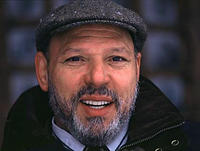I don't want to give myself all the credit but...
The Seattle-Post Intelligencer last week wrote about Jobs change of heart in announcing Video iPods:
"Before this week's unveiling of the new video-enabled iPod, Apple Computer's Steve Jobs was renowned in technology circles for his skepticism about video on portable devices.
Just how ridiculous did he consider the concept? Jobs joked in a conference call with reporters last year that if Apple were to add video to the iPod, it might as well turn the device into a toaster, too.
"I want it to brown my bagels when I'm listening to my music," he said at the time. "And we're toying with refrigeration, too."
His change of heart could have big implications for the media and entertainment world. In addition to announcing its new, video-enabled iPod this week, Apple introduced a departure from the TV industry's traditional business model -- generating revenue not by embedding advertising in the shows but by charging a small amount to download them."
We know the real reason Steve Jobs changed his mind was because of my angry email last fall at his mocking attitudes. I exculpated Steve, in that email, explaining that many professional filmmakers already carry their past movies around on their iPods from one machine to the next with their current edit to show producers or investors.
I told Steve, in my angry email, that the "cool" actors and directors keep an MPEG copy of their reel on the iPod, pull it out of their pockets, and connected it by firewire to a computer where they could show their abilities.
I told Steve, in my email blast, that the rock-video market has no resale but sits on the shelf wating for anxious teen-agers wanting their latest Coldplay or Bon-Jovi vids to add to their collections of all that fan stuff. And I told Steve in my email about the potential of PBS and the History Channel and cooking shows to repurpose their content for the pocket TiVo iPod.
I told Steve, completely aside from niche professional uses, all the home video makers using iMovie for their "Katie's Graduation," "Sophie's Birthday" or "My Vacation to San Juan Islands" movies need a device to take these movies to grandma's house and play it on the TV on Thanksgiving.
And Steve listened. So I'll take the credit. Thank you very much.
Friday, October 14, 2005
Sunday, October 02, 2005
AUGUST WILSON, 1945 - 2005

I am saddened and mourning the loss of one of America's greatest dramatists and writers: August Wilson.
Wilson heard voices. In his plays, we witnessed magnificent ensembles of characters who ennobled common men and the struggles of the soul to reconcile truth, history, politics, and individual conscience. Wilson voices lived best on the stage. Few have been translated to another medium because in their physical form, in the theatrical space, with the incredible crescendo of the speech, you had to be in the room. With Wilson's plays, you had to be there.
"I have to confess that I'm not a big movie person," Wilson said, "I don't go to a lot of films. And I don't know very much about the history of stage-to-film adaptations." It was widely known for many years that Eddie Murphy held the movie rights for Wilson's Pulitizer Prize winning FENCES. A great quote by Wilson about his dealings on FENCES when he described, you drive to the California, throw your script across the border and they throw the money back.
While Wilson's plays have not been adapted for film, his influence is huge. I attended the Eugene O'Neill National Playwright Conference the years August Wilson was there and his work thundered in our imaginations and touched many participants. In those years, the talk around O'Neil was that a Minnesota mafia had arrived. We adopted August Wilson as one of our own. Hearing his plays read, I was both awestruck and inspired. Wilson always made you feel that surge that filled the veins when history and passion came together.
When, as a fellow writer, August said, "Style ain't nothing but keeping the same idea from beginning to end. Everybody got it." he put us back on track.
Although nine of Wilson's plays were set in Pittsburgh and he lived out his final years in Seattle, he will always be important to our community after coming to St. Paul in 1978 and wrote his first play Jitney. Wilson's artistic voice and vision matured here in Minnesota, where he lived until the early 1990s. His impact on Penumbra Theater and Lou Bellamy keep his presence here resonating in our community life. Brother, you will always be a part of us.
Subscribe to:
Posts (Atom)



